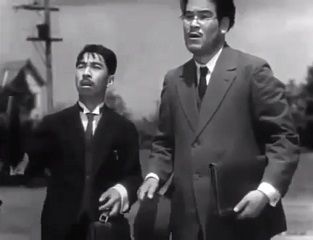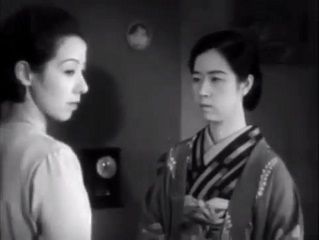Any way you look at it, you're losing this battle.

Mikio Naruse made 24 silent shorts and features before tackling his first sound film in 1935. Of those, only five are known to have survived, and all of those were released by Criterion in their 2011 Silent Naruse Eclipse set. Leading the pack is the 28-minute short Flunky, Work Hard, which Naruse wrote and directed in 1931. A film that runs the gamut from slapstick comedy to somber drama, it follows insurance salesman Okabe (Isamu Yamaguchi) as he struggles to provide for his family. His wife (Tomoko Naniwa) tells him flat-out she's "sick and tired of this poverty," and his son Susumu (Seiichi Kato) frequently gets into fights with his peers because Okabe can't afford to buy him a toy airplane. There's also a like father, like son dynamic at play since Okabe gets into a fight with Nakamura (Tokio Seki), a salesman for a rival insurance company who tries to horn in on one of his prospects. Even in Flunky's more lighthearted moments -- as in the scene where Okabe degrades himself for the benefit of a rich woman's five kids, all of whom he'd kill to write policies for -- there's an unmistakable air of desperation lurking just below the surface. And when tragedy does strike, it does so in a way that suggests Naruse knew how to milk a situation for maximum irony.

For the next film in the set, 1932's No Blood Relation, Naruse availed himself of Yasujiro Ozu's frequent collaborator Kôgo Noda, whose script opens with a virtual replay of the theft that kicks off Ozu's Walk Cheerfully from two years earlier. Played more for comedy, it finds gangster Keiji (Ichirô Yûki, late of Ozu's Days of Youth) coming to the aid of purse-snatcher Gen the Pelican (Shozaburo Abe), then meeting his sister Tamae (Yoshiko Okada) fresh off the boat from America, where she reigns as a "Hollywood Queen." When asked what she's doing back in Japan after six years, she tells reporters she's there to find the child she left behind, which is Naruse and Noda's cue to shift focus to the embattled Atsumi family.
The reason for their desperate situation? Patriarch Shunsaku's (Shinyô Nara) fishing business has gone bust, leaving him without the means to support his wife Masako (Yukiko Tsukuba) and daughter Shigeko (Hisako Kojima), who doesn't know Masako isn't her biological mother. As for Shunsaku's mother (Fumiko Katsuragi), she echoes the sentiments of Okabe's wife in Flunky when she says, "I'll be perfectly clear: I won't tolerate being poor." That explains why she's so eager to play ball with Tamae, delivering Shigeko to her after Shunsaku is sent to prison and caring little about who the child would rather be with. It's at this point that family friend Masaya (Joji Oka), just back from Manchuria, swings into action and does his utmost to reunite stepmother and daughter.
Throughout No Blood Relation, Naruse's restless camera is constantly on the move, homing in on characters when they're at their most vulnerable. He also makes splendid use of match cuts to show the bond between Masako and Shigeko even when they're separated. And while Gen the Pelican is the source for much of the film's comic relief, frequent Ozu player Tomio Aoki (of the same year's I Was Born, But... and several others) also pops up as a neighbor boy who has little luck impressing Shigeko with his fishing acumen.